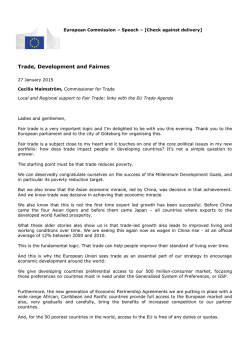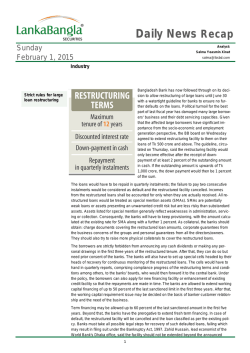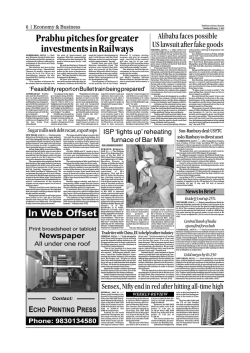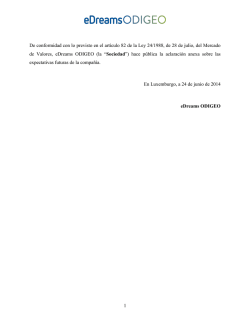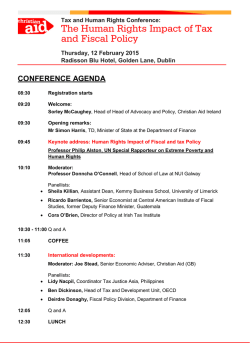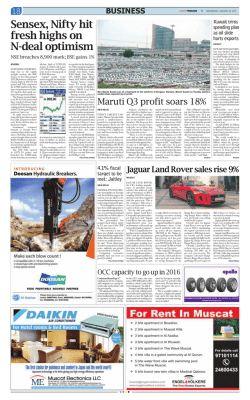
Daily News Recap
Daily News Recap Monday February 2, 2015 Analyst: Salma Yeasmin Xinat [email protected] Industry Govt may step in if large-loan restructuring policy fails: Muhith The government may tread on the central bank's path if its large loan restructuring policy fails to improve the default loan situation. “Let us see what the Bangladesh Bank has done [about the restructuring policy]. If it does not work, we will intervene,” Finance Minister AMA Muhith told reporters yesterday at his secretariat office. The central bank last week formulated a restructuring policy for large loans with relaxed conditions to relieve the handful of large borrowers from their overwhelming immediate debt burden. Asked what he thought of this bailout attempt by the central bank, Muhith said: “I don't have any quarrel with this. If I had one, you'd have known by now. It is alright.” One of the biggest beneficiaries of the policy would be the Beximco Group, and experts are of the opinion that habitual defaulters should not be offered this facility. Asked if the central bank should bar the Beximco Group from taking the restructuring facility, he said: “I will refrain from commenting on it.” He went to cite the case in 1983, when the government had to take several steps to bail out four large defaulters then. If it was not done, there would have been a severe crisis of production and employment, as they were the largest employers and the defaulters as well. Ten years later, there was another spurt of large defaults, he said, adding that the default culture started after the liberation and the rigid government policies were partly to blame. “And now we are finding it difficult to get out of this culture -- it is a very, very difficult exercise.” But the situation has improved since then: default loans now account for 8-11 percent of the total loans, in contrast to 50 percent in the 1980s, he said. News source: http://www.thedailystar.net/business/govt-may-step-in-if-large-loan-restructuringpolicy-fails-muhith-62788 The ceramics industry, which has seen investments of about Tk 5,000 crore in the past decade, is now sitting on huge stockpiles for the nonstop blockade. “Our warehouses are packed to the rafters,” said Shirajul Islam Mollah, managing director of China-Bangla Ceramic Industries. Monno Ceramic Industries, a pioneer in the sector, has halted its production line for a lack of raw materials. “We are also holding back our expansion plans for the political uncertainty,” said Moynul Islam, vice-chairman of Monno Ceramic. All 54 companies in the sector are more or less in the same boat: they have halted production for want of raw materials. But it is the companies that entered the market in the past five years that are bearing the most brunt of the political stalemate, as they have to deal with the burden of bank loans on top of the operating expenses. Ceramics makers swelling with stockpiles for turmoil More than a dozen factories were set up in the last decade thanks to natural gas supply and cheap labour. Big conglomerates, such as RAK, Abul Khair and Akij groups have also forayed into the market. Many companies were planning to double their production, riding on the growing domestic demand, said Islam, also the vice-president of Ceramic Tableware, Tiles & Sanitaryware Manufacturers and Exporters Association. Some of the companies discussed fresh 1 Daily News Recap financing for expansion with their banks, which is now on hold, he added. DBL Group, a major apparel exporter, has also set up a ceramic factory, with a view to cater to both the local and foreign markets. The company is hoping to start production by March this year, said MA Jabbar, managing director of DBL Group. Globally, the export market for ceramic products was worth more than $41.3 billion, of which Bangladesh has a share of only 0.97 percent with $47.5 million in exports in fiscal 2013-14. Bangladesh had exported ceramics worth only $1 million in 1991, meaning exports registered an average annual growth of 18.3 percent in the last two decades. The country's consumption of ceramics is still one of the lowest in the world, of just 0.2 square metres (sqm). The per capita consumption of ceramics is 3.6 sqm in Brazil, 2.6 sqm in China and 1.4 sqm in Malaysia. News source: http://www.thedailystar.net/business/ceramics-makers-swelling-with-stockpiles-for -turmoil-62792 Jute sector's loss tops Tk 5.0b for turmoil Political turmoil has hit exports and local trade of jute hard by 20-30 per cent in the last 26 days, with the sector bleeding an estimated Tk 5.1 billion, insiders said. According to businesses, August-March is the peak season for jute harvest, trading, mills' production and exports. The Bangladesh Jute Mills Corporation (BJMC), Jute Mills Association (BJMA), Jute Spinners Association (BJSA) officials said nearly 249 jute mills in the country have been forced to cut production by 42,000 tonnes owing to the blockade enforced by the BNP-led alliance since January 5. Supply shortage of raw jute, Jute Batching Oil and diesel due to halt in transportation has hampered production and exports. BJSA estimates that 96 mills under the association have cut production by 22,608 tonnes worth Tk1.7 billion since the blockade began. BJSA chairman Md Shahjahan told the FE jute yarn factories need approximately 16,000 litres of JBO per day, but supply has almost halved. He said exporters have also halted shipment as transportation cost from the factories to Benapole and Chittagong port increased by 100 per cent while orders have also fallen significantly. He said many yarn factories have cut production by 20-30 per cent. BJMA secretary A Barik Khan said 145 mills under the association have cut production by 20,000 tonnes worth Tk1.45 billion in the 26 days blockade. Many mills have cut production by more than 30 per cent, he said. An official at state-run BJMC told the FE that stockpile of the government-owned factories increased further. He said BJMC's 24 mills cut production to 400 tonnes a day from 700 tonnes last year for weak demand for jute goods, mainly sacks. He said the blockade has caused nearly a 10,000 tonnes additional to the stockpile worth Tk 700 million. Bangladesh Jute Association (BJA) secretary Abdul Kaiyum said exports fell to 1.98 million bales (bale=180 kgs) in 2013-14 from 2.05 million bales in FY'13. He said normally in October-March period, the association members export nearly 0.1-0.15 million bales per month. The shipment of raw jute faced serious setback in January as export has decreased by more than by 80 per cent. He said jute and jute sector is highly fire-sensitive. "We can't take risk in the highways," he said. Industry insiders said if political turmoil continues, jute factories will not be able to repay bank loans in time and many of them will become defaulters. Presently, there are 249 jute manufacturing units in the country. Of them, 96 private spinning mills produce jute yarn, while 24 state-owned mills and 145 private jute mills manufacture hessian, sacks and bags. Exports from the sector amounted to US$824 million in FY'14 marked, the Export Promotion Bureau data showed. News source: http://www.thefinancialexpress-bd.com/2015/02/02/78890 2 Daily News Recap Govt plans forex earnings from Bangabandhu-1 satellite The government has made plans to earn foreign exchange by leasing out half the transponders of Bangabandhu-1, the maiden satellite of the country, announced Bangladesh Telecommunication Regulatory Commission (BTRC) Chairman Sunil Kanti Bose. “Bangabandhu-1 will have 40 transponders. Among the transponders, Bangladesh will use 20, while the rest would be sold to other countries to earn money,” said Bose. The government will work to launch the satellite as well as seek out markets to lease out its transponders, said the BTRC chief, adding that Intersputnik, the International Organisation of Space Communications, will help them. A communications satellite’s channels are called transponders, because each is a separate transceiver or repeater. With digital video data compression and multiplexing, several video and audio channels can travel through a single transponder on a single wideband carrier. Bangabandhu-1 will go into operation from 2018 and the BTRC is seeking out markets, keeping this timeline in view, said the telecom authority chief. The government has fixed a target to send the satellite into the space by December 2017. The necessary work of the project will be finished by June. ATM Monirul Alam, the convener of the satellite project implementation committee, expressed his hope that many neighbouring countries would be interested to buy the transponders of Bangabandhu-1. Alam thinks Afghanistan, Indonesia and Russia are prospective markets, and that Bangladesh will get potential buyers from among them. When asked how the price of transponders would be fixed, Monirul Alam said the price would be set in accordance with the global market rate, and emphasis would be placed on earning foreign exchange by selling the transponders. The country now meets the demand for bandwidth with the state-run Bangladesh Submarine Cable Company Limited (BSCCL) and six other International Terrestrial Cables (ITCs). It also gets services from very small aperture terminals (VSATs) and other internet service providers (ISPs). After launching the satellite, it will be the main source of bandwidth in the country, and the necessary demand will be met through Bangabandhu-1. The government has estimated a total cost of Tk 2,967 crore to complete the project of launching the first-ever satellite of the country. Of the total project cost, the government will provide Tk 1,315 crore, while the remaining Tk 1,652 crore will be provided by the firm that will carry out the work. News source: http://www.theindependentbd.com/index.php? option=com_content&view=article&id=246428:govt-plans-forex-earnings-from-bangabandhu-1satellite&catid=110:business-others&Itemid=156 Two foreign life insurers to get licences Two more new foreign life insurance companies are set to get license for doing insurance business in Bangladesh as their applications have got initial consent from the regulatory authorities. The two companies are Taiyo Summit Life Insurance Company and Life Insurance Company (LIC). Insurance Development and Regulatory Authority (IDRA) gave its consent to the finance ministry of granting insurance business licenses of two companies on January 26. Earlier, on January 12, IDRA was asked by the finance ministry through a letter to give its opinion on the two license applications filed by the foreign companies. “Taiyo and LIC are good companies and it would be better if they come to Bangladesh market” opined finance minister AMA Muhith in his letter, which was sent to IDRA later on. Japanese company Taiyo Life, a joint venture company with local summit group, proposed for registering with the IDRA in the name of Taiyo Summit Life Insurance Company Limited in May 2013. According to that proposal, the paid up capital of the sponsor share was Tk150 crore while the authorised capital was Tk350 crore. Taiyo Life proposed to hold 57% of sponsor share of paid up capital. IDRA had given consent for registering the company considering its good will. After a year, Taiyo Life freshly proposed to reduce sponsor share in paid up capital to Tk18 crore from Tk150 crore. Taiyo Life also proposed to hold only 19.9% instead of earlier 57% of the sponsor share of the paid up capital. IDRA then rejected their proposals on the ground that a registered company can not be allowed to transfer of shares within three years of registration. As the second application of the company is a violation of the affidavit, the authority asked the company to receive registration certificate by December 31, 2014 following the first application. But the Taiyo Life did not receive the registration certificate. At last, IDRA finally gave its consent to accept their proposal of reducing paid up capital to Tk18 crore under a condition that the sponsor share to paid up capital of Japanese company Taiyo Life would remain unchanged at 57%. On the other hand, LIC of India, a joint venture with local company Pioneer Insurance, proposed for getting registration on May 2013 in the name of LIC of Bangladesh. 3 Daily News Recap The share of LIC of India was 90% in the sponsor portion of the paid up capital, which is restricted up to 60% according to the insurance law. Moreover, as the application was incomplete, it was turned down. After that the company appealed against the decision of IDRA on January 27, 2014. Meanwhile, the first tenure of IDRA Chairman M Shefaq Ahmed was expired just one day before of their fresh application. The then authority, however, did not consider the application of LIC. Finally, LIC got the IDRA consent for dong insurance business in Bangladesh. “The local market will be more competitive if the foreign insurances come” said Shefaq Ahmed. If the LIC and Taiyo Life transfer their Technical Know How and advance management techniques into Bangladesh, the local insurance industry will be benefited, he said. Currently, only Met Life Alico is operating their insurance business as a foreign insurance company in the local market. During the tenure of ruling party, 16 new insurance companies got license for insurance business. At present, 45 non-life insurance and 30 life insurance are operating in the market. News source: http://www.dhakatribune.com/banks/2015/feb/02/two-foreign-life-insurers-getlicences#sthash.tFg2wSTM.dpuf Economy Govt plans to trim growth target as blockade bites The government plans to revise down its economic growth target for the current fiscal year as the ongoing countrywide blockade and the associated violence have continued to hit the economy hard. “We will have to revise it because of the current situation. The revision exercise has already begun,” Finance Minister AMA Muhith told reporters at his secretariat office yesterday. The government had earlier targeted 7.3 percent economic growth for the current fiscal year. The World Bank forecast that the economy would grow by 6.2 percent this fiscal year, while the Asian Development Bank said the growth would be 6.4 percent. The central bank last week also said the GDP growth would be in the region of 6.5-6.8 percent. Muhith is due to update his colleagues in parliament on the macroeconomic situation in the second quarter of the fiscal year in the ongoing parliamentary session and he would bring in the issue of the revised GDP target then. The minister also spoke on how the nonstop blockade that entered its 28th day is getting in the way of the government's budget implementation. “Everything has been affected -- people are not being able to run their normal economic activities. How can the economy advance in this situation?” Muhith said. Nonstop blockades mixed with local and nationwide hartals have badly hit farm incomes, disrupted inter-district road and rail transport, weakened buyer confidence on the exporters' ability to deliver on time and halted the rebuilding of investor and consumer confidence. Bangladesh is counting about Tk 2,277.86 crore in economic losses a day, due to the blockade and strikes ongoing since January 6. However, it would stand at Tk 2,500 crore if the daily loss is calculated taking into account the 25 percent of the total industrial production, according to the Dhaka Chamber of Commerce and Industry (DCCI). 4 Daily News Recap The garment sector suffered losses worth Tk 695 crore a day, followed by transport and communication sector at Tk 300 crore, agriculture sector Tk 288 crore, tourism sector Tk 210 crore, poultry industry Tk 18.28 crore as a result of the violence, said the chamber. Some sectors have also come up with their own analysis. Garment exporters, whose contribution accounts for 81 percent of the country's total exports and 15 percent of the GDP, said the first 12 days of the blockade cost the industry Tk 450 crore. Realtors, who account for 7 percent of the GDP, are incurring losses of Tk 36 crore every day, said the Real Estate and Housing Association of Bangladesh. The services sector, which makes up half of the GDP, has been particularly affected, as people have been avoiding unnecessary outings fearing petrol bomb attacks, which have so far killed at least 35 and severely burnt many others. Foreign and local tourists have cancelled their tour plans in groves, hitting the tourism sector. The industrial sector, which accounts for 29 percent of the GDP, has been affected as raw materials, goods and products could not move smoothly in the last one month. Farmers could not sell their produce. Furthermore, the supply of agriculture inputs such as diesel and fertiliser has been affected ahead of the boro season, when the country produces more than half of its rice. The poultry industry, which is part of the broader agriculture sector, incurred losses of around Tk 256 crore in the first two weeks of the blockade, as farmers were unable to sell around crores of eggs, hundreds of tonnes of meat and day-old chicks, according to the Bangladesh Poultry Industries Coordination Committee. Renewed political tensions and violence may negatively affect foreign investor confidence, raising risks to growth over the long-term, Fitch Ratings said. News source: http://www.thedailystar.net/business/govt-plans-to-trim-growth-target-asblockade-bites-62775 Puzzles of prolonged political unrest upset budget revision Government's finance experts are in a fix in finalising the revised budget as they are unable to figure out real revenue mobilisation and its expenditure over the next five months. This is due to an unrelenting political unrest sweeping across the country, official sources said. Such inordinate delays in preparation and finalisation of the revised budget, including the Revised Annual Development Programme (RADP), they feel, may affect execution of the development projects earmarked for the current fiscal year. Apart from making revision of the current one, the authors would also have to craft the next new national budget amid such an ambience of uncertainty before June. The fiscal year (FY) 2014-15 ends on June 30. Officials familiar with the calculations at the Finance Division said the efforts for revenue mobilisation might be affected but they cannot forecast its magnitude. The government had squeezed its revenue target in the last fiscal year by Tk 110 billion to Tk 1250 billion following the political turmoil over the polls at the fag-end of 2013. The officials told the FE that they were really frustrated over the political developments since January 05 as the situation is affecting their preparatory activities. The official's comments highlight how the political disturbance is creating a sense of anguish among them. In the meantime, the Finance Division has decided that they would wait until February 15 for finalisation of the key estimations in relation to development expenditure. They would watch the political developments until February 15 and then give their nod about the reallocations required for the RADP and projects. After finalisation of a revised budget, the Planning Commission finalises revised annual development programme. The RADP should have been finalised within January through reallocation of funds for both ongoing and fresh projects under the annual development recipe. Another Finance Division official said the Planning Commission had been pressing them about the fund arrangement. A senior official at the Finance Division told the FE: "We've finished meetings with all ministries and divisions about the revised budget and the RADP as per our schedules much earlier." "But we cannot forecast about the revenue mobilisation in the coming months up to June," he said. "Similarly," he further said, "we cannot project whether the planned RADP will be implemented or not under the ongoing political turmoil." The senior official gasped out: "We don't know how long the political programmes will go." In making revised budgetary calculations the Finance Division relies on the economic data, especially revenue earnings and expenditures, of the first half of the fiscal year, that is, July to December. The available data in terms of revenue and the expenditure sides of July-December are better than 5 Daily News Recap that of its corresponding period in 2013. "We've data of the revenue collection and expenditure for the July-December period of the current fiscal year -- this is better than that of the last year's first-half figure," the FD official told the FE Sunday. The last quarter of 2013 (October-December) was politically disturbed, and it had affected the economy. The opposition BNP and its alliance had announced the similar blockade programmes in protest against the January 5 general election they had boycotted. He said the 'impressive' figures would not work or match with the next six months -- January to June -- as the prolonged blockade and hartals limit the overall economic activities, including slowing down the ADP implementation. The Finance Division usually doubles its estimation with some additions or subtractions in preparing the revised budget. "How will we rely on data in relation to revenue and expenditure? The whole of the 2014 calendar year was peaceful," he replied when the FE correspondent asked about the delays in doing the arithmetic of budget revision for the current fiscal year. On the contrary, the beginning of the Gregorian year and the second half of the fiscal year faced with political disturbance. "How will we make estimate? Is it possible to guess any figures, especially relating to the revenue collection, in the current situation? In his final words on the dilemmas the official said they need normalcy. "Otherwise our exercises will be futile." The RADP had faced inordinate delays last fiscal year, too, following a tussle between the Ministry of Finance and the Ministry of Planning over the size of the revised ADP. The planning ministry wanted the full amount earmarked in the 2013-14 budget. On the other hand, the finance wanted cutbacks on grounds of the political crisis in the last quarter (October-December) of 2013. However, the Finance Division later approved a Tk 600billion RADP in the last fiscal year (2013-14). The government in its original budget for the current fiscal year has allocated Tk 803.15 billion for the annual development programme (ADP). News source: http://www.thefinancialexpress-bd.com/2015/02/02/78981 S Arabia finally reopens market for BD workers In a major development, the government of Saudi Arabia got Sunday clearance from the Royal Court for resuming recruitment of Bangladeshi workers, said an official announcement in Dhaka. The formal export of Bangladeshi manpower to Saudi Arabia remained closed since 2008 following a restriction. Ahmed F. Alfahaid, Deputy Minister for International Affairs of the Ministry of Labour of the Kingdom of Saudi Arabia, phoned Shahidul Islam, the Bangladesh Ambassador to the KSA, to tell him about the all-clear on the day. The message was soon passed on to Dhaka and the Ministry of Expatriates' Welfare and Overseas Employment issued a statement. It also mentioned that a high-level Saudi delegation comprising representatives from the ministries concerned of Saudi Arabia is expected to visit Bangladesh probably in a week to formulate modalities of the recruitment". "Following continued diplomatic efforts by the Bangladesh government, including a latest official visit of Prime Minister Sheikh Hasina in 2009, the long-awaited Saudi labour market has opened for Bangladeshi workers," the statement reads. The oil-rich gulf country is the largest job market for Bangladesh. Saudi Labour Minister Adel Fakeih, after a meeting with Bangladesh Expatriates' Welfare and Overseas Employment Minister Khandker Mosharraf Hossain on January 21, said it had decided to lift the ban on recruiting Bangladeshis. The resumption of Saudi labour market will bring a great potential for the employment of professionals, skilled, semi-skilled and un-skilled Bangladeshi manpower in the oil-rich country, it said. News source: http://www.thefinancialexpress-bd.com/2015/02/02/78984 6 Daily News Recap $300m WB loan soon for export sector, market infrastructure The World Bank will lend US$ 300 million soon to facilitate long-term financing for the country’s export-oriented manufacturing sector and to strengthen financial market infrastructure, sources in the finance ministry and Bangladesh Bank said. The support from the multilateral lending agency will come under ‘Bangladesh Financial Sector Support Project’. Officials concerned in the economic relations division of the finance ministry said they were expecting to ink the deal with the WB as soon as April, so that loan disbursement can take place from the next fiscal year. Finalisation of proposals under the US$ 360 million project, US$ 60 million of which will be arranged from the national budget, is progressing fast, a senior ERD official said. Of the total US$ 360 million, US$ 260 million will primarily be earmarked to support long-term financing of export-oriented industries, US$ 95 million will be spent to strengthen financial market infrastructure, US$ 4 million for strengthening the financial sector regulators and the remaining US$ one million will be spent on project implementation and monitoring purposes. The components of the project on long-term financing will extend low-cost loans to manufacturing industries through local financial institutions. The Bangladesh Bank will administer the regulations and prepare operational modalities so that export-oriented industries get the advantage of the programme, a senior finance official said. The financing facility will continue for five years after its launching date, he added. A similar programme has been in place for the last couple of years in the country, but the initiative is plagued due to unavailability of cheap funds, sources said. ‘The programme will patronize industrial initiatives in the country, as both the WB and the government are of the view that higher cost of fund pushes up expenditure of manufacturing units,’ a BB official said. Strengthening financial market infrastructure, another project component involving US$ 95 million is aimed at improving dynamics of the financial sector through modernisation and reforms to bring about qualitative changes in the market infrastructure, sources said. The major features under the component include development of payment and settlement system, expanding and modernising the credit information bureau, strengthening the systems of the Bangladesh financial unit and integration with systems of other stakeholders and strengthening the IT governance and IT management of the BB and optimising the IT assets of the BB, according to a government document. ‘The project will lead to strengthening of the financial market infrastructure to enable a large scale shift to electronic payments in Bangladesh in general and in particular for government payments, enhancing the coverage of CIB by including credit information of the microfinance sector,’ the document reads. News source: http://newagebd.net/91348/300m-wb-loan-soon-for-export-sector-marketinfrastructure/#sthash.fVlSQQPh.dpbs Pvt sector credit growth target unrealistic amid unrest : UO The private sector credit growth target of 15.5 per cent set by Bangladesh Bank for the second half of the current fiscal 2014-15 is unrealistic amid the current state of severe political unrest, said Unnayan Onneshan, a local independent think-tank. In a rapid assessment of the monetary policy statement for January-June period of the current fiscal year, UO also said the private sector credit growth was far behind the central bank’s target in the first half of the fiscal year when the political tension was less than the current level. ‘Till November of FY2014-15 when the political unrest did not reach the current level, the private sector credit growth remained far away from the BB target of 14 per cent. The target of 15.5 per cent for the January -June period, therefore, seems to be unrealistic in view of the current state of severe political uncertainty since January 2015, said UO. It also said that the trend of shortfall in private sector credit may further worsen the sluggish private investment triggered by current political turmoil, and cause the rate of growth in gross domestic product (GDP) not to reach the target of 7.3 per cent in FY2014-15. ‘The private investment decreased by 4.93 per cent at an annual rate of 2.46 per cent from 2011-12. If this trend continues then private investment as share of GDP will be 20.86 per cent at the end of the current fiscal year,’ it said. The UO said the BB monetary policy statement is more focused on checking inflation which is restraining the country’s growth. ‘BB is consecutively taking contractionary monetary policy which restrained the credit growth in the country, depressing investment demand and contracting the possibilities of expansion of the economy,’ said the UO. It also said the country’s inflation, which came down to 6.86 per cent in July-December 2014 against the budgetary target of 7 per cent, is decreasing because of 7 Daily News Recap the fall in global oil price. ‘Due to decrease in oil price, the price of imported goods like imported edible oil and milk decreased. So in Bangladesh, inflation is on the downward trajectory with the global inflation rate,’ it said. The UO said the country’s economy is also witnessing crisis in banking sector due to increase in default loan and huge capital flight due to slack surveillance and oversight. ‘This situation is more upsetting in the State Owned Commercial banks (SCBs) and Development Financial Institutions (DFIs) for which they face huge capital shortfall. The government recapitalises the shortfall with taxpayer’s money instead of correcting the faults of the institutions which not only increases the burden on taxpayers but also causes a loss to the economy,’ it said. News source: http://newagebd.net/91344/pvt-sector-credit-growth-target-unrealistic-amidunrest-uo/#sthash.ZyrPjIVX.dpbs Capital Market Portfolio investment drops 18pc Net foreign investment on the Dhaka Stock Exchange (DSE) fell 18 per cent in January this year compared to the same month last year, as foreign fund managers adopted 'go slow' strategy due to political unrest across the country. Foreign investors bought shares worth Tk 3.65 billion and sold shares worth Tk 1.36 billion to take net investment to Tk 2.28 billion in January this year, according to statistics from the Dhaka Stock Exchange (DSE). In January 2014, portfolio investors bought shares worth Tk 4.03 billion and sold shares worth Tk 1.24 billion making a net investment of Tk 2.78 billion, the DSE data showed. "Foreign investors were cautious about taking fresh positions, particularly in large-cap stocks due to political unrest across the country since early January this year," said a leading stock broker who deals with portfolio investment. He said that though the country's economic indicators showed positive sign, the month-long political unrest forced the foreign investors to adopt 'go slow' strategy like local investors. "The foreign investors keenly observed the country's political developments as political unrest eatup companies' profitability, resulting lower dividend," he said. Stock indices also declined last month. DSEX, the benchmark index of the premier bourse, plunged 140.89 points or 2.89 per cent over the month to close at 4,724.04 points last month. Akter H Sannamat, managing director of Union Capital said that the foreign investors followed 'go slow' strategy like local investors as political front remained cloudy. The foreign investors are 'watching' the market movement and want a solution of political uncertainty, he said. He stressed political stability, improvement in power and infrastructure, macroeconomic equilibrium and conducive policies to attract more portfolio investment into the stocks. However, month-on-month net foreign investment increased by 6.04 per cent in January 2015, compared to a month ago. Also known as portfolio investment, foreign investments accounted for around 2 per cent of DSE's total market capitalisation of Tk 3140.82 billion as of Sunday. Foreign investors' preferred sectors are: banks, non-bank financial institutions, power and energy, pharmaceuticals, telecoms and IT, an investment banker said. They also focused on some multinational stocks that announced healthy dividends and generated good profits, he added. In 2014, foreign investors bought shares worth Tk 44.06 billion and sold shares worth Tk 17.98 billion to take their net investment to Tk 26.08 billion, which was a record high, according to DSE statistics. News source: http://www.thefinancialexpress-bd.com/2015/02/02/78925 8 Daily News Recap Company Lafarge, Holcim near deal to sell $7b in assets to CRH Cement companies Lafarge SA and Holcim Ltd are nearing a deal to sell at least $7 billion worth of assets to Ireland’s CRH PLC, the Wall Street Journal reported on Saturday, citing people familiar with the matter. The Journal noted that the sale of the assets in Europe, Canada and elsewhere was a precondition of winning antitrust approval for the roughly $40 billion pending merger between France’s Lafarge and Switzerland’s Holcim. The newspaper said CRH was a finalist in an auction for the assets, competing in recent days with a private-equity consortium including Blackstone Group LP, Cinven and Canada Pension Plan Investment Board. The paper said that the deal was not yet complete but CRH was poised to win the auction. News source: http://newagebd.net/91331/lafarge-holcim-near-deal-to-sell-7b-in-assets-to-crh/ #sthash.jNEnntZZ.dpbs 9 Daily News Recap LBSL’s research reports are also available on Bloomberg LANB <GO> http://lankabangla.duinvest.com Disclaimer This document (“the Report”) is published by LankaBangla Securities Ltd (“LBSL”) for information only of its clients. All information and analysis in this Report have been compiled from and analyzed on the basis of LBSL’s own research of publicly available documentation and information. LBSL has prepared the Report solely for informational purposes and consistent with Rules and regulations of SEC. The information provided in the Report is not intended to, and does not encompass all the factors to be considered in a best execution analysis and related order routing determinations. LBSL does not represent, warrant, or guarantee that the Report is accurate. LBSL disclaims liability for any direct, indirect, punitive, special, consequential, or incidental damages related to the Reports or the use of the Report. The information and analysis provided in the Report may be impacted by market data system outages or errors, both internal and external, and affected by frequent movement of market and events. Certain assumptions have been made in preparing the Report, and changes to the assumptions may have a material impact on results. The Report does not endorse or recommend any particular security or market participant. LBSL, its analysts and officers confirm that they have not received and will not receive any direct or indirect compensation in exchange for expressing any specific recommendation, opinion or views in its Report. The information and data provided herein is the exclusive property of LBSL and cannot be redistributed in any form or manner without the prior written consent of LBSL. This disclaimer applies to the Report in their entirety, irrespective of whether the Report is used or viewed in whole or in part. LBSL Capital Market Research Department Md. Mahfuzur Rahman Research In-Charge [email protected] Analyst Designation E-mail Qazi Musaddeq Ahmed, CFA Senior Research Analyst [email protected] Maksudul Haque Chowdhury Senior Research Analyst [email protected] Nazmul Ehsan Omiya Research Associate [email protected] Nazib Haider Chowdhury Research Associate [email protected] Salma Yeasmin Xinat Research Associate [email protected] Md. Mahfujur Rahman Research Associate [email protected] Pritam Saha Research Associate [email protected] Md. Rezwanur Rahman Research Associate [email protected] Institutional & Foreign Trade Department Rehan Muhammad Manager [email protected]/rmuhammad1@bloomberg .net LankaBangla Securities Limited Research & Analysis Department Corporate Office A.A. Bhaban (Level-5) 23 Motijheel C/A Dhaka-1000, Bangladesh Phone: +880-2-9513794 (Ext-118) Fax: +880-2-9563902 Website: www.lbsbd.com 10
© Copyright 2026
